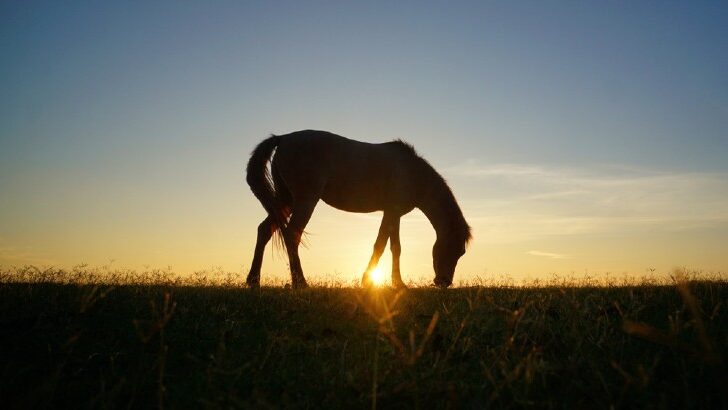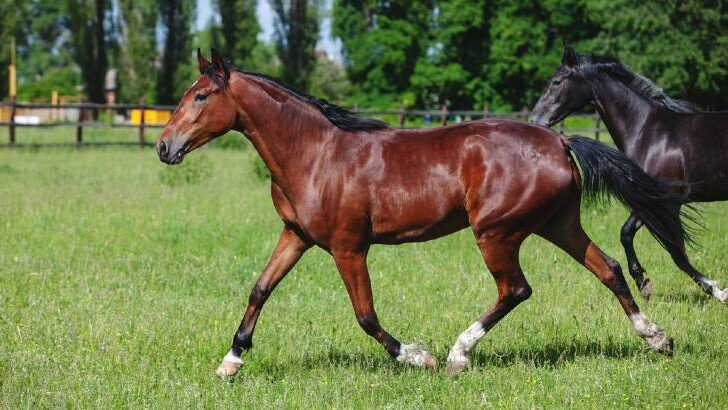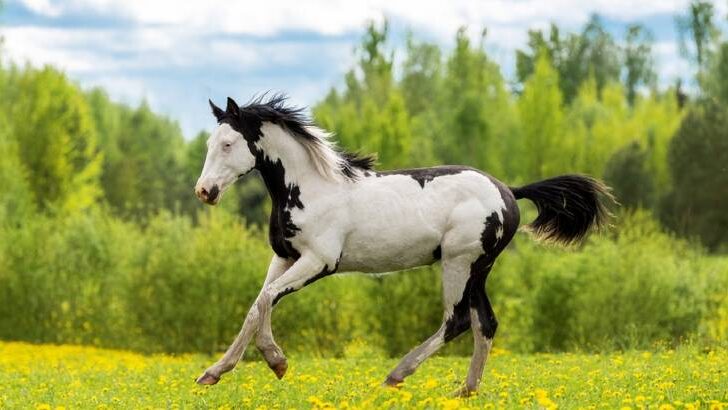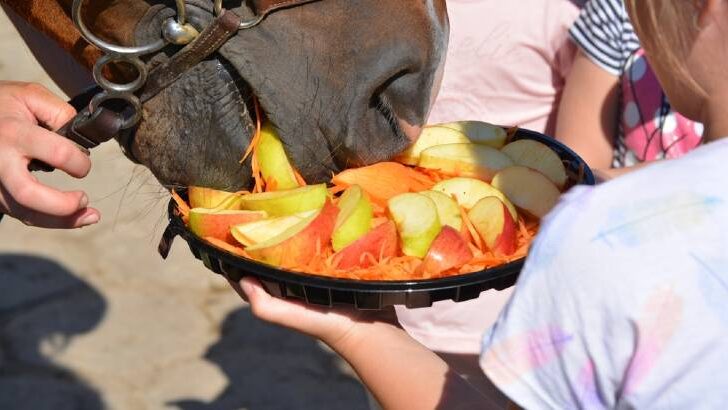Affiliate Disclaimer
As an Amazon Associate I earn from qualifying purchases. It helps me keep the website going. Thank you for your support.
Horse lovers enjoy nothing more than gazing out at a paddock full of grazing horses. What is even more magical to watch is when horses groom or play with each other. Horses form relationships with horses and other animals, including their owners. But do horses get lonely, or do they enjoy solitude?
In short, horses do get lonely. They are social creatures who evolved to live in a herd and develop bonds with other horses. Just like humans, horses get lonely when they are kept alone or when their friends leave. Loneliness can have serious health impacts on horses so it is important to ensure your horse has companionship.
Ensuring your horse does not feel isolated and lonely is an important part of caring for your horse. Loneliness, especially over a long period of time, can cause serious health issues. Read on to learn more about loneliness in horses and how you can avoid it.
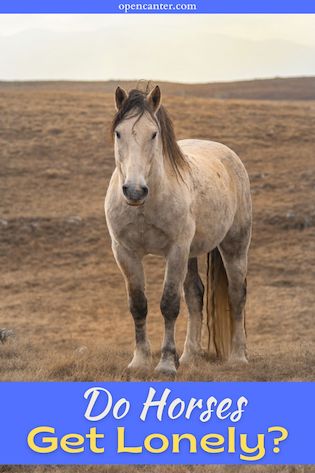
What is it Like for Horses to Be Lonely?
Loneliness is defined as a feeling of sadness or distress because one has no friends or company. Loneliness can be experienced at different levels of severity. It can also last for different periods of time, depending on the individual circumstances.
Interestingly, in humans, it is not the presence of other humans that determines whether we feel lonely or not. It is the sense of connection between us and the people around us, and the quality of our relationships. This is why some people report they still feel lonely even when they are in a crowd of people.
Horses do not seem to feel loneliness in quite the same way. Mostly, horses are content so long as they have at least one other equine friend. However, in some instances, two closely bonded horses can become distressed and lonely when they are apart. This is regardless of the presence of other horses.
Some horses also form very strong bonds with other animals, such as goats, sheep, or cows. Horses are social and curious animals and are usually willing to make friends. There are stories of some horses forming friendships with other unlikely animals like cats, dogs, or even pigs.
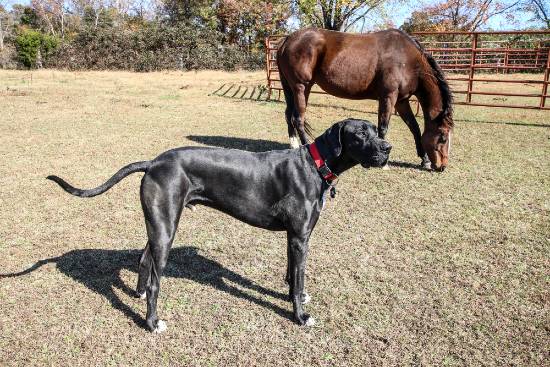
Why do Horses Get Lonely?
Despite being heavily domesticated, the herd mentality horses inherited from their wild ancestors is still strong. Wild horses lived in herds so that they could reproduce and avoid danger. For herd life to work, horses had to develop a way of communicating and bonding with each other.
Herd life helped protect each horse from danger. This is because there is safety in numbers when it comes to watching for predators. It also meant it was easier for horses to rest, as others could keep watch.
Living in a herd also gave horses a way to connect socially with other horses. Horses have developed behaviors that they use specifically for the purpose of building bonds with each other. These include mutual grooming, resting together, and standing nose to tail to swish each other’s flies away. (source)
Two Reasons Horses Experience Loneliness
The reason horses get lonely is twofold: firstly, they do actually miss their friends. When two horses normally live together, and one is taken away, the one left behind becomes lonely. It is hard for horses to understand this situation, as they don’t know when or if their friend is coming back.
Secondly, being alone means the horse is more open to attacks from predators. They do not have other horses to help keep watch. Horses who are left alone do not feel safe and this is what causes the behaviors associated with loneliness.
A study conducted by Nottingham Trent University found that stabling horses alone can cause distress. The researchers looked at four types of housing for horses – kept alone, kept individually with some contact with neighboring horses, kept in pairs, and kept in a group paddock.
The results showed that as the management style became more isolated, the horses exhibited more signs of stress and were more difficult to handle. This shows that horses get lonely and that they need to be kept in such a way so that they have companionship. (source)
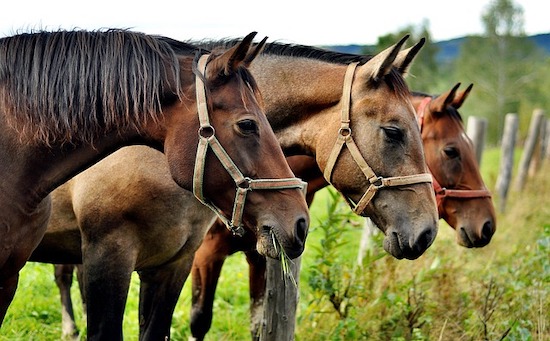
Six Signs That Your Horse Is Lonely
There are several key indicators that your horse is feeling lonely. However, not all horses will show the same signs. Some horses will show multiple signs, while others may only show one. Either way, here are some of the most common signs of loneliness in horses.
1) Loss of Appetite
When horses lose their appetite, it is an indicator that something is seriously wrong. Most horses enjoy their food and will only avoid it if they are unwell or if there is something wrong with the feed.
Loss of appetite is usually associated with both stress and depression. Horses may stop eating when they lose a paddock or stable mate or experience a change in routine.
This symptom needs to have the cause identified and treated promptly. This is because a number of serious health issues result from loss of appetite. These include stomach ulcers, colic, or laminitis.
2) Pacing or Restlessness
Just like humans, pacing and restlessness are key indicators of stress. Horses may pace around their stable or continuously walk up and down fence lines. Some horses may even run around for extended periods of time, looking for their friend.
General restlessness can make horses much more difficult to handle. They can become pushy to lead or dangerous to ride. The horse is not concentrating on the task, but rather on the stress of not having its friend nearby.
Pacing the fence comes with other risks. The horse is more likely to injure itself on the fence or become tangled. Additionally, constant and repeated movements can mean a higher risk of tendon and muscle injuries.
3) Calling Out or Whinnying
Horses don’t whinny very often, due to using body language for most of their communication. However, horses feeling alone will call out to try and find other horses.
In this instance, the horse is trying to communicate with its friend, or other nearby horses, what it is feeling. The whinny can be translated loosely to “I am here, where are you?”
If your horse has just had its paddock buddy removed, they may whinny for several hours. The whinny will usually be loud, and high-pitched. This is different from a whinny used in greeting, which is usually quieter and lower in pitch.
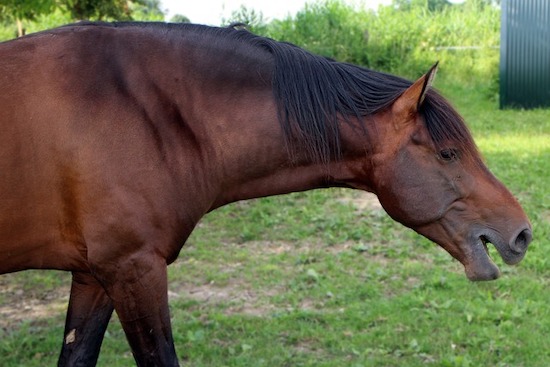
4) Damaging Behavior
Horses who are kept alone may develop damaging behavior or habits. These include kicking at stable doors or walls, crib-biting, and windsucking. Not only are these behaviors destructive, but they also negatively affect the horse’s health.
Crib biting is a repetitive behavior when the horse grasps a solid surface with their teeth. They then pull back with their neck muscles and often also grunt. They repeat this behavior on a loop. This is similar to windsucking, which is where the horse flexes his neck and noisily gulps in air.
These two habitual behaviors are linked with stress and boredom in horses. It can be likened to humans biting their nails. These are behaviors the horse uses to help them cope with increased stress or anxiety. Once these behaviors start, they become a habit and can be difficult to stop, even if the cause of the stress is removed.
5) Loss of Weight
Lonely horses are also more prone to weight loss, due to increased stress or depression. The loss of weight could be caused by the horse losing its appetite, another sign of loneliness. If the horse is constantly fence walking, this can also result in weight loss.
Weight loss is an indicator that your horse is not feeling their best. If the cause of the weight loss is not resolved, the weight loss can occur to life-threatening levels.
If your horse starts losing weight, a full health check is required. This is to pinpoint the cause of the weight loss and work out the best treatment. If it is found that your horse is lonely, then getting your horse a friend will be the only cure.
6) Depression/Listlessness
Opposite to the horses that become restless and visibly distressed are those who become depressed. Depression in horses can easily be mistaken for the horse just being of quiet temperament or tired.
Symptoms of depression in horses include the horse standing still with open eyes and a stretched-out neck. The horse will not be looking at anything in particular and will have a dull and unfocused gaze.
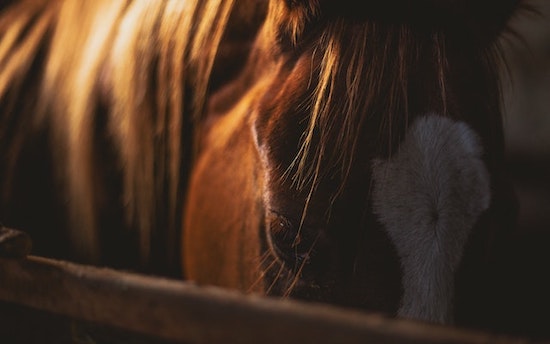
This differs from the horse who is engaged with their surroundings, as their neck is held higher and their gaze and ears are moving around. It also differs from the resting horse, whose stance is more relaxed, often with one hind leg cocked and a more rounded and lower neck. (source)
Final Thoughts
It is no surprise that horses get lonely, just as humans do. Horses are social creatures and should never be kept alone. Instead, horses are best kept in groups, with other horses or companion animals like sheep or cows. Loneliness can cause serious health issues and can mean your horse is not as happy as they could be.

